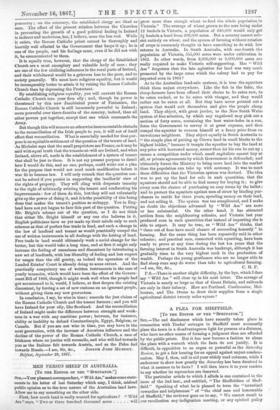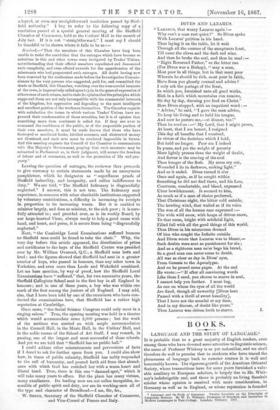A PLEA FOR SHEFFIELD.
[To THE EDITOR OF THE "SPECTATOR."] SIR,—The sad disclosures which have recently taken place in connection with Trades' outrages in Sheffield must necessarily place the town in a disadvantageous light for persons at a distance, who have no other means of forming a judgment than are afforded by the public prints. But it has now become a fashion to abuse the place with a warmth which the facts do not justify. It is difficult, in opposition to an organ so powerful as the Saturday Review, to get a fair hearing for an appeal against unjust condem- nation. May I, then, call in aid your widely read columns, while I endeavour to show how greatly the Saturday has been deceived in what it assumes to be facts ? I will then leave it to your readers to say whether its reproaches are deserved.
The particular article to which I allude is one contained in the issue of the 2nd inst., and entitled, "The Sheffieldism of Shef- field." Speaking of what he is pleased to term the "terrorized cowardice and helplessness" of "the chief men and honourable of Sheffield," the reviewer goes on to say, " We cannot recall to our recollection any indignation meeting, or any spirited policy
adopted, or even any straightforward resolution passed by Shef- field authority." I beg to refer to the following copy of a resolution passed at a special general meeting of the Sheffield Chamber of Commerce, held at the Cutlera' Hall in the month of July last. If it is not "straightforward," I must say I should be thankful to be shown where it fails to be so :—
Resoked,—" That the members of this Chamber have long been unable to resist the conviction that the outrages which have become so notorious in this and other towns were instigated by Trades' Unions, notwithstanding that their official members repudiated and denounced such complicity, and even offered rewards for the apprehension of the miscreants who had perpetrated such outrages. All doubt having now been removed by the confessions made before the Investigation Commis- sioners by the very persons who suggested, paid for, and committed the deeds at Sheffield, this Chamber, watching over the commercial interests of the town, is imperatively called upon to join in the general expression of abhorrence of such crimes, and to state its opinion that the principles which suggested them are not only incompatible with the commercial interests of the kingdom, but oppressive and degrading to the most intelligent and excellent portion of the workmen themselves. The Chamber regards with satisfaction the terms in which various Trades' Unions have ex- pressed their condemnation of these atrocities, but it is of opinion that something more than sentiment is called for. If they arc over to command the confidence of the public, or of the respectable portion of their own members, it must be made known that those who have destroyed or mutilated books, falsified accounts, and abstracted money are dismissed, and such acts must be rendered impossible in future. And this meeting requests the Council of the Chamber to communicate with Her Majesty's Government, praying that such measures may be submitted to Parliament as, in their judgment, will secure the freedom of labour and of commerce, as well as the protection of life and pro- perty."
Leaving the question of outrages, the reviewer then proceeds to give currency to certain statements made by an anonymous pamphleteer, which he designates as "superfluous proofs of Sheffield imbecility, and incapacity, and sullen indifference to duty." We are told, "The Sheffield Infirmary is disgracefully neglected." I answer, this is not true. The Infirmary may experience, in common with other charitable institutions supported by voluntary contributions, a difficulty in increasing its receipts in proportion to its increasing wants. But it is enabled to minister largely, and does so minister, to the sick poor ; it is care- fully attended to ; and presided over, as is its weekly Buard, by our large-hearted Vicar, always ready to help a good cause with hand, and heart, and purse, it is secure from being "disgracefully neglected."
Next, "the Cambridge Local Examinations suffered because no Sheffield man could be found to take the chair." Why, the very day before this article appeared, the distribution of prizes and certificates to the boys of the Sheffield Centre was presided over by Mr. William Overend, Q.C., a Sheffield man born and bred ; and the figures showed that Sheffield had sent in a greater number of boys, who passed in honours, than any other town in Yorkshire, and even more than Leeds and Wakefield combined. Let me here mention, by way of proof, how the Sheffield Local Examinations have "suffered," that, for two successive years, the- Sheffield Collegiate School sent in the first boy in all England in honours ; and in one of those years, a boy who was within one mark of the first among the juniors of all England. I may add, also, that I have been told by one of the examiners who have con- ducted the examinations here, that Sheffield has a rather high reputation at Cambridge.
Once more, "the Social Science Congress could only meet in a singing saloon." True, the opening meeting was held in a theatre which would accommodate some 2,000 persons ; but the work of the sections was carried on with ample accommodation in the Council Hall, in the Music Hall, in the Cutlers' Hall, and in the noble rooms of the School of Art itself, I may remark, in passing, one of the largest and most successful of these schools. And yet we are told that "Sheffield has no public hall."
I could adduce other misstatements and perversions of facts if I dared to ask for further space from you. I could also show how, in times of public calamity, Sheffield has nobly responded to the call of humanity, and poured forth aid from that abund- ance with which God has enriched her with a warm heart and liberal hand. True, there is this one "damned spot," which it will take many years to efface. But the place has many virtues, many excellences. Its leading men are not sullen incapables, in- sensible of public spirit and duty, nor are its working-men all of the type and character of Broadhead.—I am, Sir, &c., W. SMITH, Secretary of the Sheffield Chamber of Commerce, and Vice-Consul of France and Italy.



































 Previous page
Previous page